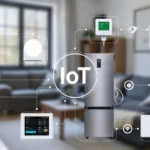Securing our digital lives has become paramount in an age of rising data breaches and identity theft. Biometric hardware, an innovative fusion of technology and biology, stands at the forefront of this endeavor, promising a more secure and seamless future. As we embrace this revolution, we witness the transformation of personal identification, privacy, and user experience.
Biometric hardware devices and sensors capture, process, and analyze individuals’ unique physical or behavioral traits. These traits, such as fingerprints, facial features, iris patterns, and even behavioral biometrics like typing patterns, are distinctive to each person, offering unprecedented security. Integrating these biometric identifiers into hardware devices reshapes authentication mechanisms, replacing traditional passwords and PINs.
One of the most significant advantages of biometric hardware is its potential to enhance security. Biometric traits are difficult to replicate or forge, providing a robust defense against unauthorized access. From unlocking smartphones to accessing sensitive facilities, biometric authentication ensures that only authorized individuals can proceed, significantly reducing the risk of identity theft and fraud.
Users no longer need to remember complex passwords or carry physical tokens; their unique biological markers become their keys. The solution streamlines access to devices, applications, and services, enhancing user experience and productivity. In an increasingly connected world, where ease of use is essential, biometric hardware sets a new standard.
The applications of biometric hardware are expansive, spanning various sectors. In finance, biometric authentication secures financial transactions and provides a seamless payment experience. In healthcare, it ensures the privacy and security of patients’ medical records. In transportation, biometric solutions enhance border security and facilitate efficient travel. The potential applications continue to grow, promising a future where biometrics plays a vital role in every aspect of our lives.
However, as we embrace the promise of biometric hardware, we must also address its ethical and privacy implications. The collection and storage of biometric data raises concerns about potential misuse, unauthorized access, and the risk of surveillance. Robust privacy regulations and secure storage protocols are imperative to ensure that individuals’ sensitive data remains protected and used only for its intended purposes.
Biometric hardware represents a significant stride towards a more secure, convenient, and technologically advanced future. As we navigate this transformative landscape, we must balance innovation and safeguarding individual rights. With careful consideration and responsible deployment, biometric hardware can redefine security while respecting privacy and empowering individuals in the digital age.







